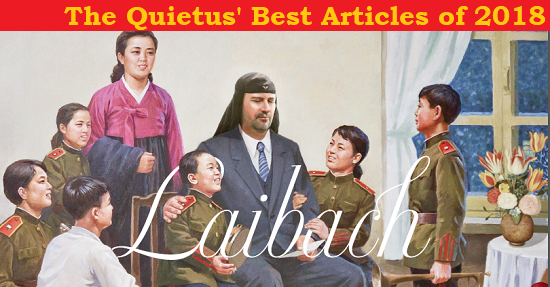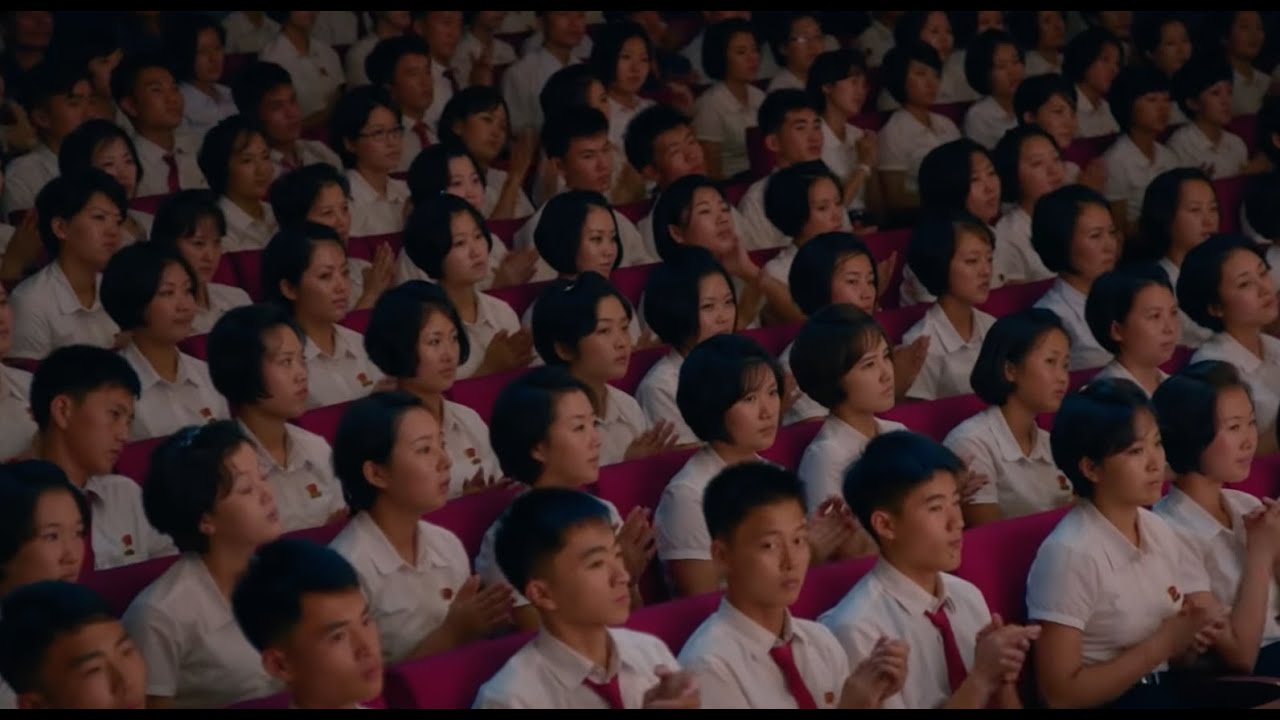In the sleevenotes to The Sound Of Music, their interpretations of songs from the 1965 musical, Laibach quote from a Kim Jong Il ‘talk to creative workers’ from 1974. "Adaptation is a new form of creative work," the text reads. "Adaptation translates the ideological content of one original work into another in conformity with the characteristics of the latter form of art and literature." In it, there’s a neat summary of Laibach’s strategies. Since the early 80s, the Slovenians have adapted the "ideological content" of western pop and totalitarian governments alike. This record, the product of Laibach’s 2015 trip to play a concert in DPRK capital Pyongyang, is perhaps the deeply misunderstood group’s most remarkable release of recent times.
Totalitarianism is a difficult aesthetic to explore in art (which is in part why tQ is currently running this series of essays), but Laibach’s lived experience means they’re more capable than most. Their four decades of provocation and obfuscation are inseparable from their roots in late-1970s and early-80s Communist Yugoslavia, as described by the band in some detail for The Quietus a few years ago. They were born under and forced to participate in a totalitarian system from a young age, as made explicit by their early use of uniforms and smoke grenades stolen from army barracks during various members’ time as conscripts. They no doubt had family from preceding generations who ended up ground in the teeth of mechanised warfare between the systems of fascism and communism. This is why, in our time of rising populism and autocratic leaders, their voice is more relevant than ever. It’s also why their Pyongyang trip made a lot more sense than the lol-ing, cod-incredulous reaction granted to it by perennially smug John Oliver on Last Week Tonight, thus:
As ever with Laibach, the trip was far more than the chance to get some provocative press shots taken in front of monumental state landmarks (though they did that, of course, with the result that if you now Google image search “fascist music” a Daily Mail article featuring the band in Pyongyang is the top result). This first gig by a ‘western’ band (inverted commas as Laibach have never seemed especially of the west) was organised by Finnish artist Morten Traavik, who has long sought to undermine the blanket western hostility to the DPRK – he also organised for North Korean children to perform a cover of A-ha’s ‘Take On Me’.
By travelling to the closed country, Laibach were pushing boundaries, not least their own. I suspect part of their motivation for undertaking the trip was a quest of self-examination. It very nearly backfired: the final track on this album is ‘Welcome Speech’, in which a DPRK official lambasts the group for their mockery of national anthems and for their “fascism” – something the government had picked up from the aforementioned global media hoo-ha that accompanied Laibach’s visit. At this point the gig was off, and only eventually happened because they were able to convince North Korean officials that no, they weren’t fascists and that, just like the country they were visiting, they were hugely misunderstood in the west.
The Sound Of Music is, curiously enough, the only western music that is not only permitted but actively encouraged in the DPRK, and used as a tool to help schoolchildren learn English. It’s the decision to play the songs from the musical that I think makes the Laibach trip to North Korea and this record a success in a way that their just turning up to stomp out ‘Tanz Mit Laibach’ wouldn’t. These few songs are perhaps the only indelible cultural connections between the people of the DPRK and the rest of the world.
In these interpretations there’s a genuine affection for the songs, rather than an ironic, slapdash appropriation. These are, after all, some of the most charming, evocative, emotionally powerful pieces of music ever written. The Sound Of Music is such a magically powerful film that once, on a redeye flight from San Francisco to New York, it had me in floods of tears. It works because it manages to be at once utterly sentimental in its celebration of family and connection to a landscape, but also defiant in its rejection of fascism. It’s also radical in its politics – whereas most war films (and I absolutely believe it is of the genre) of the time were heavily macho affairs, The Sound Of Music had a nanny and a convent of nuns as the heroes fighting the macho forces of Nazism. There’s also the sub-narrative of painful loss of innocence, both political and sexual, in the prospect of Austrian anschluss with Nazi Germany and the moral battle lost by the young Rolf.
In their interpretations, Laibach rather brilliantly add their own sense of drama and emotion to the original score. For those who include among their misconceptions of Laibach an assumption that their music is all noise and clattering, there’s none of that here. It sounds like the musical, just with a Laibach filter over everything. ‘The Hills Are Alive’ is an appropriately grand and sweeping vista of piano and strings and vocals emoted strongly, as if to project from a stage during a telly talent show. The title song is yet another application by Laibach to write a James Bond theme, all stirring repeated vocal lines and pomp. ‘Do-Ri-Mi’ has a sedate sense of drama, ‘Lonely Goatherd’ is even more skittishly charming than the original, and perhaps best experienced while watching the video:
‘Sixteen Going On Seventeen’ is inescapably creepy, Milan Fras’ guttural voice intoning “You need someone older and wiser / Telling you what to do.” His presence though is what makes Laibach’s The Sound Of Music such a brilliantly weird listen. It’s most effective on the wonderful version of ‘So Long, Farewell’, where a child’s choir (complete with that slight reverb that makes them sound like they’re selling Oreos on a schmaltzy American Christmas ad) is backed by shuffling rhythms and gently sniffing strings. The clock cuckoos as Fras and the children’s choir sing “the sun has gone to bed / and so must I”, and it becomes a deeply affecting song of innocence and experience. Changing the lyrics of finale ‘Maria’ to “How do you solve a problem like Korea?” gives the entire song a thoughtful, reflective air: "Many a thing you know you’d like to tell her / Many a thing she ought to understand / But how do you make her stay and listen to all you say?”
Past Laibach ‘adaptations’ have included the world’s national anthems (in 2006 album Volk) and seen them cover the entirety of The Beatles’ Let It Be, the Rolling Stones’ ‘Sympathy For The Devil’ and Bob Dylan’s ‘Ballad Of A Tin Man’. Yet those artists failed to penetrate the cultural walls of the world’s most closed Communist dictatorship. You don’t have to stand for Kim Jong-un to appreciate Laibach’s unusual alliance with the DPRK in cocking a snook at the cultural hegemony of the 60s rock canon via a celebration of that oft-derided cultural form, the musical.
Laibach have made art out of the existence of a deeply repressive regime who persecute their own people and whose relationship with a temperamental adult-baby in the White House threatens the security of the globe, but it isn’t some exploitative, tactless, flippant gesture. To get to grips with the myriad grotesque and nightmarish situations that face us in this strange and uncomfortable era requires strange and uncomfortable art made by those who have empathy and understanding. We need more like Laibach, not fewer. Playful, poignant, sublime and ridiculous, in The Sound Of Music Laibach continue to hold up a mirror to a divided world.





